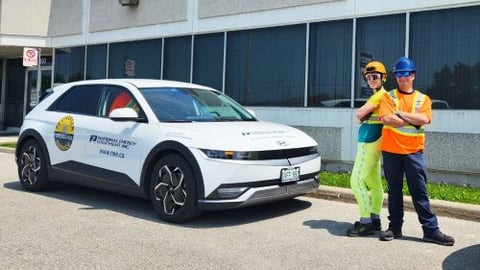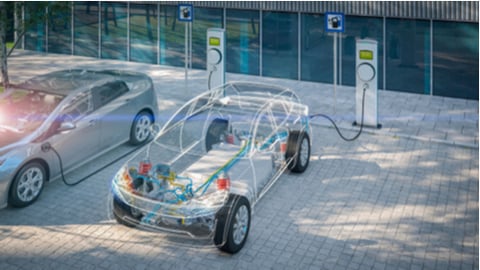Fewer people intend to buy an EV amid price, driving range concerns: EY report
A new survey finds fewer drivers intend to make their next car purchase an electric vehicle.
EY's Mobility Consumer Index report shows overall intentions among survey respondents to buy a new vehicle were up six per cent compared with last year. But fewer of them are leaning toward buying an EV.
Intentions to buy a fully electric, plug-in hybrid or hybrid vehicle in the next two years slightly dipped to 50% this year, compared with 52 per cent in 2023, the report published Wednesday, said.
It breaks the trend of increases in recent years. In 2021, about 35% of all potential vehicle buyers in Canada were interested in an EV or a hybrid, that number jumped to 46% in 2022.
"That flattening curve is something new that we're seeing," said Jennifer Rogers, automotive and transportation leader at EY Canada, in an interview.
When it comes to fully electric vehicles only, buying intentions fell to 15% this year, compared with 18% last year.
The top concerns survey respondents had are the limited driving range, the price tag of EVs, expensive battery replacements and a lack of charging infrastructure.
"The lack of charging infrastructure and the range anxiety is sort of working hand-in-hand," said Rogers, adding people are particularly concerned about charging their vehicles outside of their home.
She said improving public charging infrastructure can reduce range anxiety among EV drivers.
"It's going to be very challenging to sort of convince consumers to take that next step without there being some sort of comfort around the ability to charge outside their home," Rogers said.
She said consumer concerns need to be addressed if Canada wants to meet its target of all new light-duty vehicle sales being zero-emission by 2035.
In December 2023, the federal government finalized its plans to gradually phase out sales of new gas-powered cars in favour of zero-emission vehicles.
The phase out will happen in stages — 20% in 2026, increasing to 60% by 2030, and reaching 100% by 2035.
Rogers says the drop in demand for EVs "definitely shows there's going to be a lot of pressure on meeting those targets."
The price tag of electric vehicles, combined with economic headwinds such as inflation and high interest rates, may also dissuade many car buyers from considering EVs.
According to Canadian Black Book, the average cost of an electric vehicle was about $73,000 in 2023.
Meanwhile, some automakers have delayed or paused EV production as demand drops. Ford Motor Co., for example, pushed out its plans to manufacture EVs at its Oakville, Ont., plant by two years.
Government rebates have played an important role for people considering EVs, with 28% of Canadians saying incentives are a top consideration when purchasing, the report said.
But Rogers said incentives aren't enough to drive demand for EVs as fewer affordable options exist.
"Even though incentives are available for them to take … that incentive on its own probably isn't enough to change that consumer behaviour," she said.
For those who were considering buying an EV, steep gasoline costs were top of mind, followed by environmental considerations and monetary incentives, according to the report.
Rogers said it is easy to get early adopters into the EV market, but it could take time to capture a bigger cohort.
"That next block of people that need to make the move from the combustion engine to electric vehicles is going to be a little bit harder to convince," she said.
"They may be more price sensitive, may not have as easy access to in-home charging."




